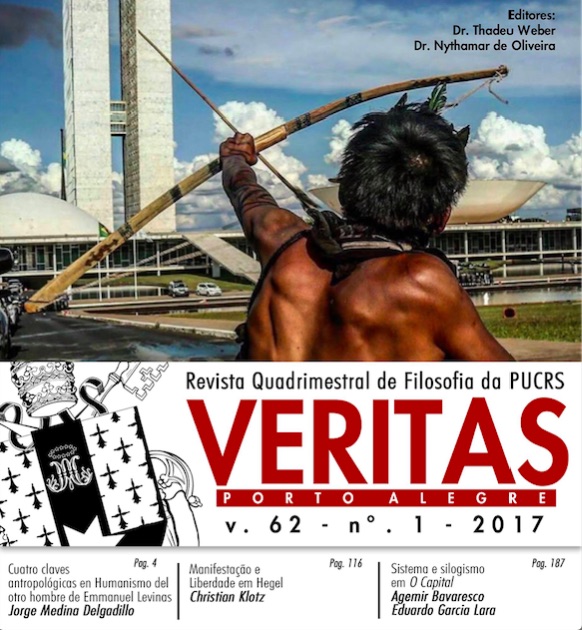System and syllogism in Marx’s Capital
DOI:
https://doi.org/10.15448/1984-6746.2017.1.26263Keywords:
Syllogism, System, Political Economy, New Dialectics.Abstract
Hegel's and Marx's intellectual undertakings remain relevant to an examination of our world. Both authors have elaborated, from different approaches, on important elements concerning modern capitalist societies. Tracing the precise connections between both thinkers, nevertheless, is still a challenge—even though it is now clear that these relationships are not one of idealism versus materialism, but, precisely, the overcoming of such dualism, as Western Marxism and Critical Theory have shown. In its Anglophone version, those inquiries grew and expanded upon different trends, among those, remarkably, New Dialectics. This article aims to analyze Hegel's theory of syllogism as a key to reading Marx's Capital as it has been proposed by Tony Smith. To this end, the paper seeks to reconstruct Smith's interpretation of Hegel’s theory of syllogism and its applications for Hegel's Philosophy of Right as well as to Marx’s Capital. According to Smith, Marx's Capital, the presentation of the dialectical articulations of the categories of political economy in the capitalist mode of production as a specific social order, derives its critical power and scientific coherence precisely from its use of Hegel’s theory of syllogism—which allows Marx to analyze the processes in the social world as organic entities constituted through the articulation of moments of universality, particularity, and individuality. The result is an investigation that seeks to bring Hegel's Logic closer to Marx’s Capital.
Downloads
References
FRASER, I.; BURNS, T. Introduction: An Historical Survey of the Hegel–Marx Connection. In: BURNS, T.; FRASER, I. (Eds.). The Hegel-Marx connection. New York: St. Martin’s Press, 2000. p. 1–33. DOI: https://doi.org/10.1057/9780230595934_1
HARTMANN, K. Die Ontologische Option. Zeitschrift für Philosophische
Forschung, v. 33, n. 4, p. 638–641, 1979. DOI: https://doi.org/10.1176/appi.psychotherapy.1979.33.4.638
____. Hegel: A Non-Metaphysical View. In: Hegel: A Collection of Critical Essays. [s.l.: s.n.], 1972, p. 101–24.
HEGEL, G. W. F. Enciclopédia das Ciências Filosóficas em Compêndio (1830): I - A ciência da lógica. Tradução, notas, glossário e bibliografia de Paulo Meneses et alii. 2. ed. São Paulo: Loyola, 2005.
____. Linhas Fundamentais da Filosofia do Direito ou Direito Natural e Ciência do Estado em Compêndio. Tradução, notas, glossário e bibliografia de Paulo Meneses et alii. Recife, PE: UNICAP; São Paulo, SP: Loyola; São Leopoldo: UNISINOS, 2010.
____. A teoria hegeliana do silogismo: tradução e comentário. Tradução Federico Orsini. Porto Alegre: Editora Fi, 2016.
LEVINE, N. Divergent Paths: The Hegelian foundations of Marx’s method. Lanham, MD: Lexington Books, 2006.
MARX, K. O capital: crítica da economia política; livro primeiro - o processo de produção do capital. Tradução Rubens Enderle. São Paulo: Boitempo Editorial, 2013.
PINKARD, T. P. Hegel’s Dialectic: The Explanation of Possibility. Philadelphia, PA: Temple University Press, 1988.
____. The Logic of Hegel’s Logic. Journal of the History of Philosophy, v. 17, n. 4, p. 417–435, 1979. DOI: https://doi.org/10.1353/hph.2008.0205
SMITH, T. The Logic of Marx’s Capital: Replies to Hegelian Criticisms. New York, NY: SUNY Press, 1990.
____. Dialectical Social Theory and Its Critics: From Hegel to Analytical Marxism and Postmodernism. New York, NY: SUNY Press, 1993.
____. The Role of Ethics in Social Theory: Essays from a Habermasian Perspective. Albany: State University of New York Press, 1991.
____. Hegel, Marx and the Comprehension of Capitalism. In: MOSELEY, F.; SMITH, T. (Eds.). Marx’s Capital and Hegel’s Logic. Leiden: Brill, 2014. p. 15–40. DOI: https://doi.org/10.1163/9789004270022_003
Downloads
Published
How to Cite
Issue
Section
License
Copyright
The submission of originals to Revista Veritas implies the transfer by the authors of the right for publication. Authors retain copyright and grant the journal right of first publication. If the authors wish to include the same data into another publication, they must cite Revista Veritas as the site of original publication.
Creative Commons License
Except where otherwise specified, material published in this journal is licensed under a Creative Commons Attribution 4.0 International license, which allows unrestricted use, distribution and reproduction in any medium, provided the original publication is correctly cited. Copyright: © 2006-2020 EDIPUCRS</p






